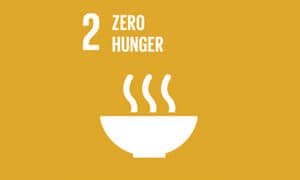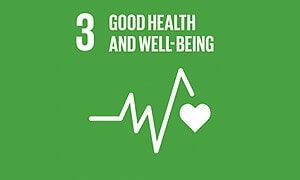- At a Glance
- Reporting and Transparency
- ESG Ratings and Rankings
- Environment
- Social
-
Governance
- Sustainability in the Supervisory board
- Bayer Sustainability Council
- Bioethics Council
- UN Global Compact
- Product Stewardship
- Supplier Management
- Group Regulations
-
Group Positions
- BASE
- Bioethical Principles
- Protection of Biodiversity
- Position on Global Product Strategy
- Position on Responsible Care
- Position on Deforestation and Forest Degradation
- Position on Insect Decline
- Raising the Bar on Crop Protection Safety Standards
- UN Sustainable Development Goals
- Position on Sustainable Beef Production
Bayer’s Position towards the UN Sustainable Development Goals (SDGs)
In September 2015, the United Nations (UN) adopted “Agenda 2030,” setting a total of 17 Sustainable Development Goals (SDGs). These are designed to generate solutions to overcome global challenges such as poverty, hunger, health care, gender equality, climate change and numerous others.
Bayer expressly advocates the comprehensive approach of the SDGs. We recognize urgent action is required, and as a leader in the fields of nutrition and health we want to make substantial contributions and develop collaborative new solutions with partners. Bayer’s economic success goes hand in hand with promoting sustainable development, which for us means more people in all regions around the world being able to live a better life in harmony with the ecosystem.
In focusing our strategy on sustainability, we have set our own targets for 2030 that will make a relevant contribution to achieving the UN Development Goals – based on our core competencies, this means in particular combating hunger (SDG 2) and promoting health (SDG 3). However, we will also work resolutely toward promoting gender equality (SDG 5), reducing greenhouse gases, tackling climate change (SDG 13) and supporting life on land (SDG 15).
SDG 2: End hunger, achieve food security and improved nutrition, and promote sustainable agriculture.
 We consider achieving this objective to be inextricably linked with sustainably intensifying agriculture. Feeding an increasing number of people from shrinking arable land per head is a global challenge for the agricultural industry. The ground needs to be cultivated in an environmentally friendly and resource-saving manner that increases the yields and quality of harvest by approximately one half by 2050 (compared to 2012), according to the United Nations. The global population is expected to grow (from just over 7 billion in 2012) to almost 10 billion people by then.
We consider achieving this objective to be inextricably linked with sustainably intensifying agriculture. Feeding an increasing number of people from shrinking arable land per head is a global challenge for the agricultural industry. The ground needs to be cultivated in an environmentally friendly and resource-saving manner that increases the yields and quality of harvest by approximately one half by 2050 (compared to 2012), according to the United Nations. The global population is expected to grow (from just over 7 billion in 2012) to almost 10 billion people by then.
At the same time, biodiversity must be protected and greenhouse gas emissions drastically reduced.
This calls for a combination of a wide range of measures and new solutions – including developing high-yield, stress-resistant varieties and using climate-friendly, resource-saving methods that, above all, avoid plowing that releases CO2 and use water, crop protection products and fertilizers more efficiently. Digitalization creates these possibilities in the form of “precision landscaping.”
Bayer will focus primarily on smallholders in developing countries and emerging economies, who produce 80 percent of the domestic population’s food supply. However, they themselves often suffer food shortages, live on the poverty line and do not progress beyond subsistence agriculture. We will develop tailor-made solutions for them, assist them with other problems such as lending, storage, transportation and sales, and offer even more training in good agricultural practice. By 2030, we aim to have supported 100 million smallholders in developing countries and emerging economies as a means of helping improve the local production of food supplies and reduce poverty in rural areas.
SDG 3: Ensure healthy lives and promote well-being for all at all ages.
 We aim to enable people to share in medical progress, regardless of their income or background.
We aim to enable people to share in medical progress, regardless of their income or background.
As a Life Science company, health care is an important focus of our business. Based on scientific findings, we develop innovative products and solutions to improve people’s quality of life through disease prevention and treatment and to make a responsible contribution to the welfare of society.
To achieve this, we invest significantly each year in researching and developing new pharmaceuticals and treatments. To offer access to state-of-the-art medication to people in developing countries and emerging economies with low purchasing power and substandard health systems, we have spent many years supporting patient programs and collaborating with the World Health Organization (WHO), international aid agencies, nongovernmental organizations and political decision-makers.
Our current focus lies on the availability of contraceptives and products for fighting neglected tropical diseases such as Chagas and African sleeping sickness. Our measures always also include information and training offers.
By 2030, we aim to provide 100 million women in developing countries and emerging economies with the access to the modern-day contraception that more than 200 million women worldwide currently lack. This is one way in which we intend to help improve local food supplies and reduce poverty in rural areas. We also consider this a significant contribution toward reaching the goals set by the United Nations of empowering women and achieving gender equality (SDG 5).
In addition, Bayer will expand access to everyday health for 100 million people in underserved communities around the world with an initial focus on women’s health and expanding access to micronutrients for pregnant women and children.
In general, Bayer is working on adapting its pricing policy towards local purchasing power and strengthening the patient access programs to increase the availability and affordability of Bayer products.








